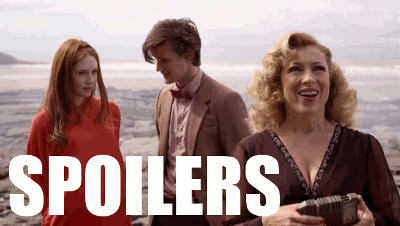Welcome to the YA Book Club! Today we’re talking about Veronica Roth’s Allegiant. If you’ve read the
book and posted a review of it on your blog, be sure to link to it below. And if
you don’t have a blog, get ready to discuss the book in the comments.
There are a lot of things that I could say about Allegiant and the Divergent trilogy as a
whole, but I don’t intend to turn this review into a thesis and I’m positive
you’ll be thankful for that. So I’m going to focus on the ending. But first:
If you have not yet read Allegiant,
please take a detour to some other location on the Internet. THIS REVIEW
CONTAINS THE MOST SPOILERY OF SPOILERS.
Do we need another warning?
I assume you’ve been thoroughly warned. Moving on: That
ending.
One of the reasons I read is to escape. When my EM is
flaring and my feet are engulfed in burning pain, I open a book and slip into
someone else’s life. There’s this idea that as readers looking for escape we
deserve happy endings. The Man is adamant about this fact and loudly
disapproving of movies and books in which a main character dies. I agree—to a
point. There have been times I’ve watched a movie that kills main characters for
no other reason than shock value, and that’s frustrating. But a main
character’s death can also be a powerful thing.
I almost always prefer a happy ending in contemporary
romances. That’s not saying the characters must live (see The Fault in Our Stars) but that I prefer the love interests to end
up together.
I don’t feel the same about other genres. The Divergent
trilogy never was about the romance, though that became a larger part
throughout the novels and especially in this last book. No, the books were
about strength and truth and sacrifice and fear and a hundred other things that
had nothing to do with girl + boy = love. And I think, looking at the events
surrounding the last dozen or so chapters, the ending Veronica Roth chose is
the only ending that fits.
Do I wish Tris lived and her and Four had a happily ever
after in new Chicago? Of course. But had Tris let Caleb die for her, she
wouldn’t be Tris. She’s not the girl who let’s her brother make a sacrifice to
end his guilt—even if he betrayed her. Fact is, she’s stronger than Caleb and I
would have been disappointed in her had she not stepped up.
It’s one thing to give readers the ending they want. A lot
of times that’s enough. But in this case, I think the book and the series as a
whole was more powerful because Roth gave readers the ending they deserved—the
only story that made sense for these characters.
Consider Tris in Divergent,
torn between the selfless girl she was brought up to be and the fearless one
she’s trying to become. In this book, in her final sacrifice, I think she found
the best possible fusion of the two. What she did was selfless, but brave. And
not brave in the Dauntless sense of the word, where bravery is doing daring stunts for a rush or fighting fear to be stronger, more powerful. No, she used
her bravery in her selfless act and in that I think she got at what the point
of her actions were: to create a world where people aren’t divided by factions
or left factionless, but a happy medium. It’s the idea that humans are
better with a mix of virtues and vices than stripped down.
It also, I think, show’s Roth’s bravery. It has to be a
tough choice, as an author as famous and adored as she is, to kill a character
you love and in doing so possibly deliver an ending everyone won’t agree with.







No comments:
Post a Comment